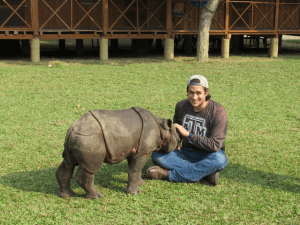Career
What Do Graduates Do?
- Address complex problems that relate to the health of animals and people
- Operate as field epidemiologists investigating new and emerging diseases
- Serve as leaders for zoonoses prevention and control programs such as rabies, food borne illnesses, and arboviruses
- Prepare and respond to bioterrorism and other public health emergencies
- Work to ensure the health of humans and animals by promoting safe natural and working environments
- Develop public policy at local, state, national, and international levels
DVM/MPH practice areas
- Risk communication
- Food safety
- Zoonoses control
- Public health leadership/policy
- Disaster preparedness
- Occupational health
- Teaching and research
- Epidemiology
- Environmental health
Where do they work?
Private industry: Pharmaceutical and vaccine companies, food processors, medical device companies
Government agencies: Departments of Agriculture; Departments of Natural Resources, Departments of Public Health, Center for Epidemiology and Animal Health, Centers for Disease Control and Prevention
International organizations: Food and Agriculture Organization of the United Nations, World Health Organization, World Animal Health Organization
Uniformed services: Army Veterinary Corps, Air Force Health Officer, Public Health Corps
International public health agencies: Veterinarians without Borders, Heifer Project International, Pan American Health Organization
Veterinary Public Health DVM/MPH In-Depth Career Information
Current Student Profile
 Branden Nettles, DVM 2019, MPH 2023
Branden Nettles, DVM 2019, MPH 2023
I am a veterinarian and foreign service officer with the Animal and Plant Health Inspection Service (APHIS) posted to New Delhi, India. Throughout my time in school I always wanted to work in international public health. Now I engage with foreign counterparts and other U.S. government agencies to safeguard the United States from transboundary animal diseases and plant pests. My unique training combines both my veterinary education and my MPH education and allows me to bring a multidisciplinary, One Health approach to issues. I love working abroad and being able to apply myself to issues important in international public health and international agriculture.
Discover how our faculty, career coaches, mentorship program, and deep connections with community and national health organizations directly support your success.
